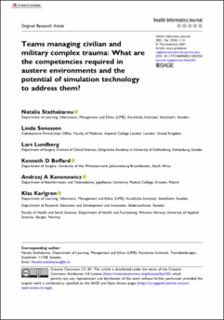| dc.contributor.author | Stathakarou, Natalia | |
| dc.contributor.author | Sonesson, Linda | |
| dc.contributor.author | Lundberg, Lars | |
| dc.contributor.author | Boffard, Kenneth D | |
| dc.contributor.author | Kononowicz, Andrzej A | |
| dc.contributor.author | Karlgren, Klas | |
| dc.date.accessioned | 2022-02-07T08:07:02Z | |
| dc.date.available | 2022-02-07T08:07:02Z | |
| dc.date.created | 2021-12-20T18:27:06Z | |
| dc.date.issued | 2021 | |
| dc.identifier.citation | Stathakarou, N., Sonesson, L., Lundberg, L., Boffard, K. D., Kononowicz, A. A., & Karlgren, K. (2021). Teams managing civilian and military complex trauma: What are the competencies required in austere environments and the potential of simulation technology to address them? Health Informatics Journal, 27(4). | en_US |
| dc.identifier.issn | 1460-4582 | |
| dc.identifier.uri | https://hdl.handle.net/11250/2977362 | |
| dc.description.abstract | Surgical training in civilian hospitals may not be sufficient for managing complex trauma in a setting where such care is not commonly practiced. Understanding the challenges that civilian teams face when moving to austere environments can inform the competencies that need to be trained. The aim of this study was to explore the competencies required in austere environments for teams managing complex trauma, and how they can be trained with simulation technologies. Ethnographic field observations were conducted, and field notes were synthesized. The field notes were structured with the elements of Activity Theory to generate the teams’ competencies that need to be trained. A literature review was conducted to verify the results and identify examples of relevant simulation modalities. The analysis resulted in a structured list of competencies for civilian teams to manage complex trauma in an austere environment and recommendations which simulation technologies could be used in training of those competencies based on published studies. Our study contributes to understanding the challenges that civilian teams face when operating in an austere environment. A systematized list of competencies with suggested simulation technologies directs future research to improve quality of complex trauma training in civilian and military collaboration. | en_US |
| dc.language.iso | eng | en_US |
| dc.publisher | SAGE Publications | en_US |
| dc.rights | Navngivelse 4.0 Internasjonal | * |
| dc.rights.uri | http://creativecommons.org/licenses/by/4.0/deed.no | * |
| dc.title | Teams managing civilian and military complex trauma: What are the competencies required in austere environments and the potential of simulation technology to address them? | en_US |
| dc.type | Peer reviewed | en_US |
| dc.type | Journal article | en_US |
| dc.description.version | publishedVersion | en_US |
| dc.rights.holder | © The Author(s) 2021 | en_US |
| dc.source.volume | 27 | en_US |
| dc.source.journal | Health Informatics Journal | en_US |
| dc.source.issue | 4 | en_US |
| dc.identifier.doi | 10.1177/14604582211052253 | |
| dc.identifier.cristin | 1970736 | |
| cristin.ispublished | true | |
| cristin.fulltext | original | |
| cristin.qualitycode | 1 | |

